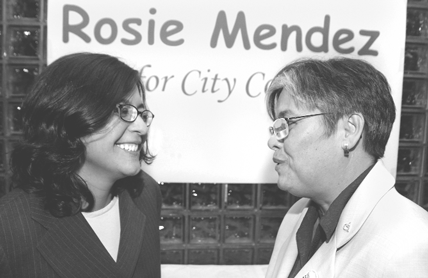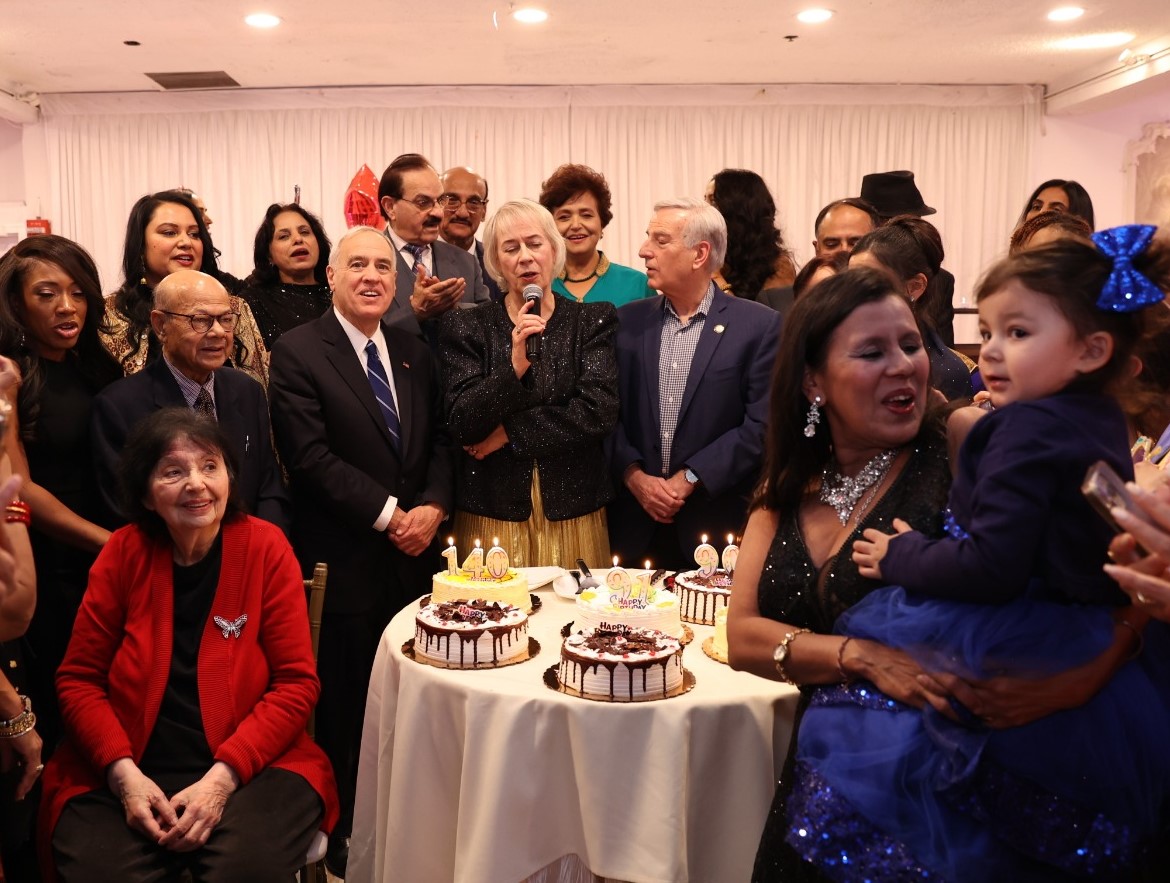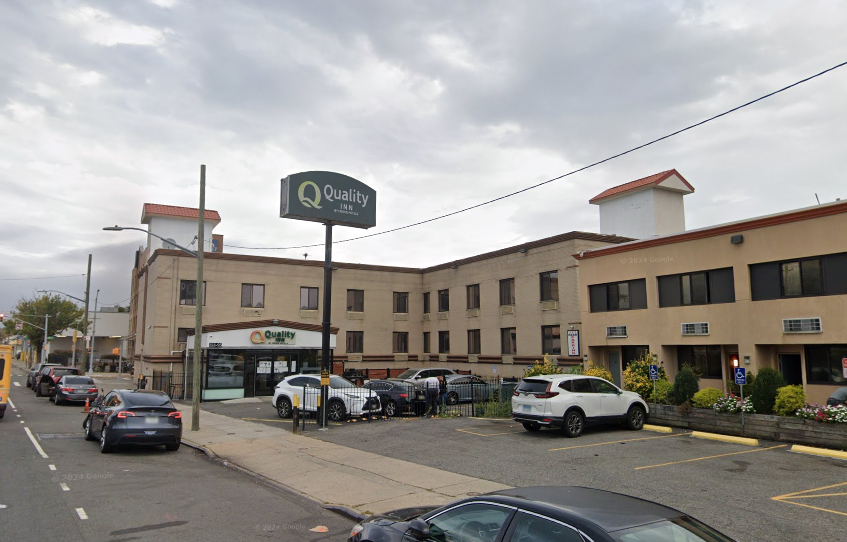By Lincoln Anderson
Councilmember Rosie Mendez is standing up for her mentor, Margarita Lopez, in the wake of a campaign finance scandal that some believe may have torpedoed Lopez’s chances of landing a job in the Bloomberg administration, as well as running for State Assembly.
In addition, Mendez is defending her own role in handing out checks to individuals after the election. Philip Van Aver, a volunteer on Lopez’s 2001 City Council re-election campaign, this week, in another surprising revelation, told The Villager that it was Mendez who handed him a $300 check at a Coalition for a District Alternative meeting in February 2002, three months after the general election of Nov. 6, 2001.
Post-election payments are impermissible under the campaign finance law.
Lopez had to leave the City Council at the end of last year due to term limits. Mendez, her handpicked successor, won election handily. Lopez crossed party lines last year to endorse Mayor Bloomberg for re-election, leading many to believe she was possibly in line for a position in his second administration. But two-and-a-half months later, Lopez still hasn’t been tapped to join Bloomberg’s City Hall team. She also surprisingly opted not to run in a special election last month for the vacant 74th Assembly District seat.
On top of Lopez’s current unemployment, The Villager has confirmed that she mortgaged her Catskills country house — nicknamed “The Little House” — last year apparently to pay back 10 friends and supporters who loaned her money so she could make a $186,000 payment relating to her campaign finance problems.
Last month, the Campaign Finance Board ruled Lopez’s 2001 City Council re-election campaign improperly used public funds to make post-election payments to individuals and also made material misrepresentations to the board. The violations were so serious the finance board declared the Lopez ’01 campaign to be in breach of certification — meaning all $139,000 in taxpayer-funded public matching money Lopez received for her 2001 campaign had to be returned. The C.F.B. tacked on additional fines of $31,000, bringing the total amount Lopez was fined to about $170,000.
Sharing the wealth
According to sources, after the election, the campaign had money left over — in fact, about $45,000 — and Lopez decided to give some bonuses to “friends” — individuals who had worked hard on the campaign or had worked on her previous campaigns.
At a hearing this January, a half-dozen Lopez ’01 campaign workers — including a former Community School Board 1 member — offered a variety of convenient reasons why they deposited their campaign checks so late, from “it’s a cultural thing” to being “bad with paperwork.” At the hearing, Lopez indignantly blasted the Campaign Finance Board, saying, “My name have been put through the mud,” while Ann Johnson, her campaign treasurer, accused the C.F.B., “Margarita and I have both been slandered by you.”
However, last November, Van Aver broke ranks with the campaign’s agreed-upon version of events, admitting to The Villager he had received a $300 check three months after the general election. As a volunteer, he wasn’t even supposed to be paid. Van Aver said Lopez’s volunteer coordinator even tried to persuade him to sign an affidavit claiming he had been a campaign worker. He refused.
Van Aver this week revealed to The Villager that it was Mendez who hand-delivered the post-election check to him in an envelope at a Feb. 26, 2002, meeting of Coalition for a District Alternative, Lopez and Mendez’s political organization. And yet, Van Aver feels Mendez — whom, he noted, is an attorney and “very smart” — didn’t knowingly do anything wrong.
“Rosie handed me the check and I don’t think she had any idea it was an illegal payment,” he said. “I walked home with Susan Stetzer, who was CoDA co-chairperson then, and I asked her about it, and she looked very upset about it. She expressed amazement [at the lateness of the payment].” Added Van Aver, “I don’t think Rosie played a major role in this.”
Asked if she indeed gave Van Aver the late check at the CoDA meeting, Mendez said, “I could have — I don’t recall who I gave checks to. It was four years ago — like 15 campaigns ago — it was awhile.”
Mendez — a former district leader who worked on Lopez ’s campaign and was also Lopez’s City Council chief of staff — says she’s confident she, Lopez and the campaign didn’t knowingly do anything to violate the campaign finance law. In addition to their close political relationship, Mendez and Lopez are personally close. The two live in the same E. 11th St. former Homesteader Program tenement and are good friends.
“I know that Margarita did not intend to do anything wrong. That was their determination,” Mendez said of the C.F.B.’s ruling. “I hope she does appeal — if she can do it financially…. They’re the ruling body,” she said of the finance board. “That’s why in this country we have an appeals process.”
Activists and checks
Late-deposited checks and suspect patterns of check serial numbers raised red flags for the Campaign Finance Board, making the board suspect there were impermissible post-election payments. But, Mendez said, taking one’s time to deposit checks isn’t that unusual, particularly among Lower East Side activists.
“It’s been my experience that I’ve seen that happen,” she told The Villager. “I’ve known some of my friends to hold onto their checks for a week, a couple of weeks — so I believe it. I don’t know if it’s cultural. I think it’s an individual thing. I’ve seen it in a number of people. I don’t know if it has to do with people being activists: You work a full-time job, you volunteer with all these organizations, you’re raising kids and sometimes one thing takes precedence over others.”
Having to mortgage one’s country house to pay off a heavy $170,000 fine from the Campaign Finance Board is a bit unusual, though. Last November, according to the Sullivan County Office of Real Property, Lopez mortgaged her country house by the Delaware River in Lumberland, N.Y., for $123,500. Records show Lopez bought the property, a 520-square-foot bungalow on 1.13 acres of land, for $49,000 in 1998.
“It seems like it might have been a fixer-upper and she improved it,” said David Knudsen, an assistant real-estate broker with Catskills Buyers Agency. “She’s still shown as the owner.”
The mortgage was apparently used to help pay back the $166,000 that 10 friends and supporters loaned Lopez in August to help her pay the C.F.B. $186,000 to allow her to get matching funds for her 2005 borough president campaign while the finance board was still completing its audit of her disputed 2001 finances. Lopez paid back these loans from the individuals “months ago,” according to Mendez. But the attorney who represented her 2001 campaign against the finance board’s charges, Jerry Goldfeder, doesn’t work for free, so a court appeal of the C.F.B. ruling could just add to Lopez’s bill.
Mendez and Goldfeder both claimed not to know that Lopez had mortgaged her country house.
“I don’t feel it’s right to ask about when it comes to personal stuff, like financial things and religion,” Mendez said of why she didn’t ask Lopez about it.
Mendez also defended Johnson, the campaign treasurer.
“I think that they did the best that they could,” Mendez said. “It was Ann’s first time dealing with campaign finance. She was very meticulous — not giving a check unless she had the Social Security number.”
While it may have been the first time Johnson, a former chairperson and current member of Community Board 3, dealt with campaign finance laws, it wasn’t Lopez’s: Lopez first ran for City Council in 1997, narrowly beating Judy Rapfogel in the Democratic primary race.
New York City’s campaign finance program offers political candidates up to $4 for every $1 they raise. But the money can only be spent on election-related activities and all expenses must be carefully documented. After the election, leftover funds must be returned to the city — not doled out to friends and supporters as gifts or bonuses.
Six have breached
Since the city’s campaign finance program started in 1988, more than 1,000 candidates have participated in the program, according to C.F.B. During that time, only six candidates, including Lopez, have been found in breach of certification. (Joseph Dweck in 1999, Sheldon Leffler and George Martinez in 2001 and Geoffrey Davis and David Miller in 2003 are the others.)
Asked how serious a violation must be for the C.F.B. to declare a breach of certification, Kate Schachern, a finance board spokesperson, issued a statement saying it’s “only for the most egregious violations”:
“A Board finding of breach of certification is essentially a finding that a campaign has so fundamentally failed to live up to its obligation under the certification that the public should not be required to pay public tax dollars, given the campaign’s failure to give the public what the campaign undertook to do,” that statement said. “The breach rule reflects the Board’s sense that such a severe consequence — the finding that a participant is ineligible for public funds, including forfeiture of all public funds previously paid — is applied only for the most egregious violations. The rule is intended to deter severe abuses of Program obligations.”
In the 2001 election, 205 New York City candidates received public matching funds to the tune of more than $42 million. After the election, candidates returned more than $5.7 million in unspent public funds to the city. However, according to the finance board, Lopez’s campaign “improperly converted” public funds to make $45,000 in impermissible post-election payments to campaign workers and other individuals, as well as to make a $1,350 payment to Lopez and Mendez’s E. 11th St. building.
Mendez on her role
Mendez hardly figured in the hearings on Lopez’s ’01 campaign finances. However, her name was mentioned once during the Jan. 12 hearing: Lopez — in explaining how it was difficult to locate some people who were owed checks — said the campaign delivered checks both by mail and hand and that Mendez was responsible for the latter.
“Councilmember Rosa Mendez was the person delivering the checks by hand,” Lopez said in her testimony.
However, Mendez said there was nothing improper about how or when she made the payments.
“Margarita Lopez and Ann Johnson mailed out the checks,” Mendez told The Villager, “and many checks came back and there were certain individuals that we didn’t have the right addresses. When checks came back or they didn’t have all the information, Margarita asked me to give out the checks. She came back to me with some names of people and asked me if I knew them. And one individual had moved. We got the address from Housing Works. [And] whichever checks that were left that weren’t sent by mail, we tried to get them to people as fast as possible…. We didn’t have an apartment number, we didn’t have a zip code. Stuff like that.”
Asked how many checks she personally delivered, Mendez said, “I really got no idea. It was four years ago.”
In the case of the campaign worker from Housing Works, Mendez said he first lived in the AIDS housing organization’s transitional facility on Ninth St. and Avenue D but, unbeknownst to the Lopez campaign, then moved to Brooklyn. When Mendez called Housing Works’s main location on W. 13th St. to check on his whereabouts, he happened to be there, and she went right over to give him his check, she said.
Mendez said she didn’t remember exactly when she was delivering these checks, since it was an extremely hectic time with 9/11 and its impacts and aftereffects, which were felt in Council District 2. She also remembers that at that time she was busy getting ready to move into another apartment — which she was renovating — in her building. She said she’s sure, though, she gave out the checks after the Nov. 6 election but before Jan. 1, 2002, when she settled into her new apartment.
Yet, Van Aver said she gave him a check on Feb. 26, 2002.
Mendez said she doesn’t remember all the people she gave checks to, saying, “The only one I remember was Michael Hartzog [from Housing Works], because I drove my car over there to give him his check on my lunch break — and grabbed a sandwich.”
Tough audits needed
One Downtown political figure who ran in the Democratic primary in Lower Manhattan’s Council District 1 in 2001 — and whose campaign wasn’t fined by C.F.B. for any violations — said the finance board is “like a pit bull” when auditing candidates’ finances.
“They were extremely, extremely meticulous in their review,” he said.
Still, the former candidate said, campaigns often successfully fudge expenses.
“There’s something called ‘walking-around money,’ ” he explained. “It’s typical that Margarita’s volunteer said he got cash. Basically, in a lot of campaigns, cash will be distributed to volunteers…and they go around and get out voters. It’s finessed in the [campaigns’] accounting.”
At the January finance board hearing, Lopez ’01 treasurer Johnson complained of being “raked over the coals” by the C.F.B.
But the former District 1 candidate, who requested anonymity, said he feels the tough reviews are necessary.
“I think it’s appropriate when there are public funds,” he said. “It would follow that if you’re giving tens of thousands of dollars to people, you have to expect this kind of review.”
The Lopez ’01 campaign’s attorney, Jerry Goldfeder, though, doesn’t feel the finance board’s finding the Lopez campaign to be in breach of certification was appropriate, but, rather, selective.
“They charge it all the time,” he said. “My guess is they’ve charged it many, many times — and they’ve only found it in six circumstances. What’s the standard? There appears to be none…. This just shows again that the Campaign Finance Board operates on an ad-hoc basis, selectively — enforcing a rule for which there is no standard whatsoever.”
As for what the general public and others will make of Lopez’s campaign finance meltdown, though, it remains to be seen. Mendez, for one, isn’t counting Lopez out.
“Only time will tell,” she said. “People have short memories. You never know how things will play out in politics.”
Similarly, one East Village politico — expecting things will eventually blow over — predicted, “I think Margarita’s still going to get a job with Bloomberg.”





































